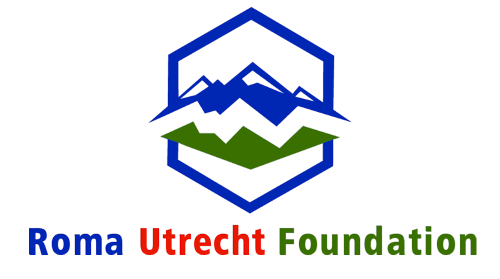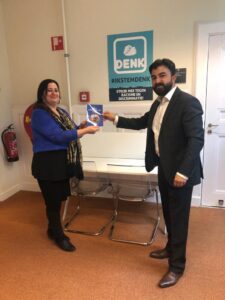ERGO Network responds to the Action Plan for the European Pillar of Social Rights
On 4 March 2021, the European Commission proposed an Action Plan for the implementation of the European Pillar of Social Rights (Social Pillar), aiming to turn its 20 policy principles into concrete policy actions. The European Commission has pledged to make the Social Pillar “the compass of Europe’s recovery and our best tool to ensuring no one is left behind”.
The Action Plan draws on a wide-scale public consultation, which received over 1000 responses, including ERGO Network’s comprehensive position paper How to ensure that the European Pillar of Social Rights delivers on Roma equality, inclusion, and participation?, where each of the 20 principles is explained in terms of its implications for Roma rights, including relevant thematic statistics and concrete policy recommendations.
=> Access ERGO Network’s full response to the Action Plan
ERGO Network warmly welcomes the inclusion of the EU Strategic Framework and Council Recommendation on Roma Equality, Inclusion, and Participation as an integrant policy action of the Social Pillar Action Plan, which firmly anchors the delivery on the EU Roma Framework under the umbrella of the Social Pillar and throughout the European Semester. Unfortunately, the European Roma are only mentioned once in the rest of the document, exclusively in relation to employment. It is a missed opportunity not to have a specific focus on the Roma also in other areas, such as skills, equality, and poverty.
More encouragingly, ethnic minorities or ethnic background are referred to several times. While wording could have been stronger, the mentions are very welcome, as they uphold and mainstream Principle 3, Equal Opportunities. The plight of vulnerable and disadvantaged groups is highlighted a few times throughout the text, and the Action Plan includes several welcome references to combatting discrimination. While this is positive, unfortunately the document falls short of mainstreaming a true anti-discrimination approach in all its areas.
ERGO Network further welcomes the fact that the Action Plan includes concrete, quantifiable targets, on employment, education, and poverty reduction. These mirror objectives also included in the EU Strategic Framework for Roma Equality, Participation, and Inclusion – though the links are, sadly, not made explicit in the Action Plan. While equality is combined with the target on skills, there is no corresponding measurable objective. Moreover, the Equality section of the Action Plan focusses exclusively on gender equality and the inclusion of people with disabilities. It is unfortunate that other groups did not receive the same attention, particularly as their thematic EU strategies are clearly mentioned as falling under the scope of the Social Pillar.
We further appreciate that the implementation of the Action Plan on the European Pillar of Social Rights will be explicitly monitored through the European Semester and the National Recovery and Resilience Plans. While the targets set minimum standards, it is hoped that Member States will raise the level of ambition in defining their own national targets. In this context, we very much welcome the European Commission’s encouragement to Member States to collect data disaggregated by racial or ethnic origin, in line with the EU Anti-Racism Action Plan.
ERGO Network very much welcomes that the revised Social Scoreboard will also apply in enlargement countries, as part of the Economic Reform Programme (ERP) process, while the Instrument of Pre-accession Assistance (IPA) III will provide increased funding for a flagship initiative to implement Youth Guarantee schemes, as part of the dialogue with Western Balkans.
Member States are encouraged to make use of the full range of EU funds available to implement the Action Plan, but no specific earmarking of funds is connected to the targets of the Pillar, and there is no minimum social expenditure foreseen for the Recovery and Resilience Facility. The European Commission must issue clear guidelines to Governments and Managing Authorities for allocations to be made for the vulnerable and Roma especially – including through a corresponding enabling condition and Roma-specific indicator.
It is very positive that civil society is mentioned explicitly and repeatedly as a partner for the implementation of the Action Plan, and Member States are encouraged to ensure engagement of all relevant stakeholders. The Action Plan will only be effective if it achieves wide ownership by beneficiaries, and if it is rooted in direct evidence from the ground. Roma communities and their NGO representatives must be involved at all stages of policy design, delivery, and monitoring.
For more information about ERGO Network’s work on EU social inclusion and employment policy (European Semester, European Pillar of Social Rights, Sustainable Development Goals etc), please contact Senior Policy Adviser Amana Ferro.



 Bulgaria:
Bulgaria:
 Utrecht Foundation & the Roma Advocacy Network Netherlands, we have been working for almost for 20 years as volunteer activists from the Roma grassroots level. In October 2020 a motion by Selçuk Öztürk on antigypsyism and how to combat this injustice has been adopted by the majority of the Dutch National Parliament.
Utrecht Foundation & the Roma Advocacy Network Netherlands, we have been working for almost for 20 years as volunteer activists from the Roma grassroots level. In October 2020 a motion by Selçuk Öztürk on antigypsyism and how to combat this injustice has been adopted by the majority of the Dutch National Parliament.
 face economic and social inequalities and live in a position particularly vulnerable to violence and discrimination. Compared to most women in the Czech society, these women are often at higher risk of social exclusion, live under worse material conditions, and have a lower quality of life. The problems of these women are often overlooked, which is why the Invisible Power coalition, with the support of the German EVZ Foundation, was founded—to give these women space to be seen and heard. The coalition represents a collaborative effort of the Czech Women’s Lobby (CWL) and its member organizations Association for Integration and Migration (SIMI) and SLOVO 21, under which the Roma women’s group Manushe operates.
face economic and social inequalities and live in a position particularly vulnerable to violence and discrimination. Compared to most women in the Czech society, these women are often at higher risk of social exclusion, live under worse material conditions, and have a lower quality of life. The problems of these women are often overlooked, which is why the Invisible Power coalition, with the support of the German EVZ Foundation, was founded—to give these women space to be seen and heard. The coalition represents a collaborative effort of the Czech Women’s Lobby (CWL) and its member organizations Association for Integration and Migration (SIMI) and SLOVO 21, under which the Roma women’s group Manushe operates.
 The employee expects 8 half-day theoretical trainings and 16 half-day practical workshops (2 trainings and 4 workshops in each locality) in the field of advocacy activities. The participants will then be permanently supported by experts in the form of tailor-made consultations.
The employee expects 8 half-day theoretical trainings and 16 half-day practical workshops (2 trainings and 4 workshops in each locality) in the field of advocacy activities. The participants will then be permanently supported by experts in the form of tailor-made consultations.